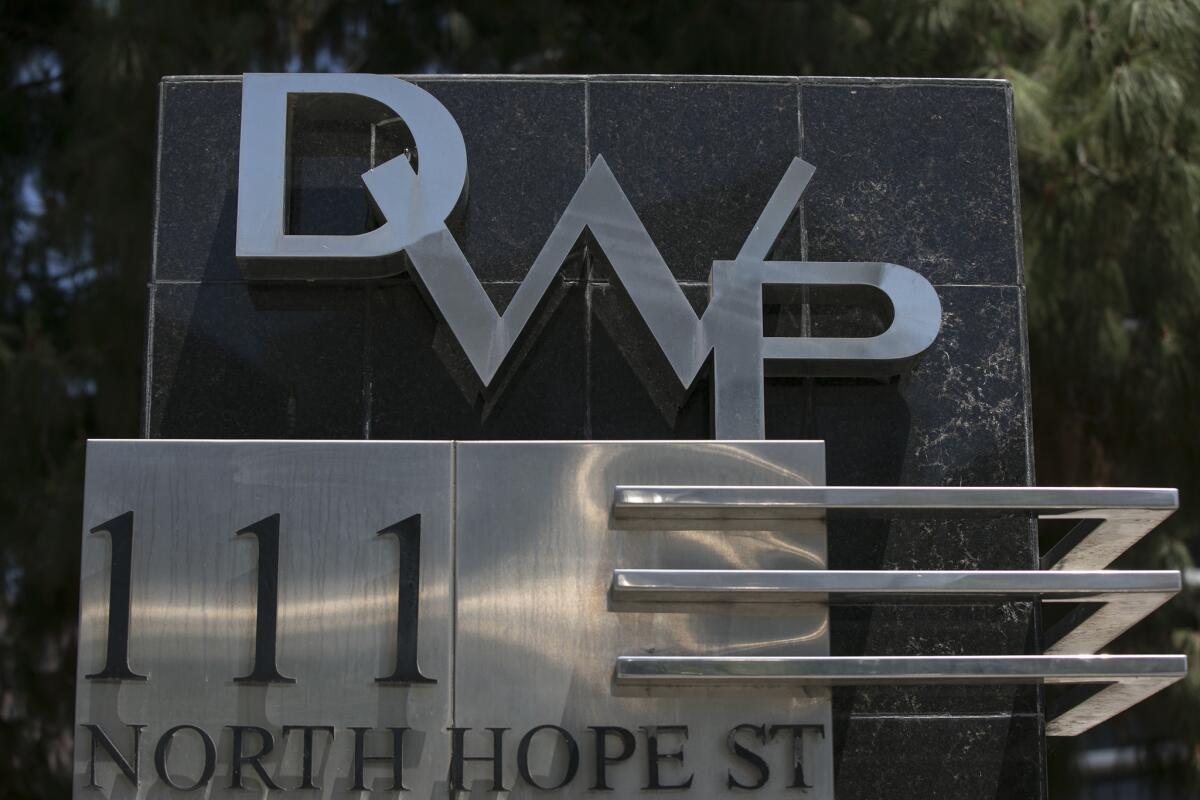Water, electricity rate hikes move a step closer for DWP customers

A Los Angeles City Council committee approved water and electricity rate hikes Tuesday. The plan now goes to the full council.
- Share via
A Los Angeles City Council committee approved plans Tuesday to increase water and power rates, moving Department of Water and Power customers one step closer to higher bills this spring.
With three members present, the Energy and Environment Committee cleared the way for the full council to consider the DWP’s rate proposals at its Wednesday meeting.
If approved, rates will increase 4.7% for water and 3.86% for power each year for five years, the city’s ratepayer advocate said.
The DWP estimates that customers who use “typical” amounts of water and electricity will see a 3% average annual increase to their monthly bills. At the end of five years, those customers would pay about $21 more on their monthly bills than they do now, the utility says.
“The water case … has some very good policy,” committee Chairman Felipe Fuentes said, citing the move from two to four rate tiers to create an incentive for conservation. “On the electric side of things, I’m nervous.”
“We only have the ability to affirm or deny,” he continued. “So I don’t know what to do but support both of those cases.”
DWP officials have been campaigning for the $330-million water rate hike and a $720-million power rate increase for the last several months. They say the revenue is necessary to replace aging water mains and develop more local water supplies. On the power side, officials estimate that about 80% of new revenue would go toward meeting clean energy and climate change mandates.
In 2014, a massive pipe rupture near UCLA flooded the campus and surrounding streets, underscoring the need to replace aging water lines. Meanwhile, the city faces mandates related to renewable energy, “once-through” ocean water cooling and coal-fired power.
DWP officials warned Tuesday that failing to meet those requirements could result in massive fines and a downgraded credit rating, which could force the agency to demand a larger rate increase down the road and lay off recently hired customer service representatives.
“This is always going to be a balancing act,” DWP General Manager Marcie Edwards said. “We did our best work in trying to find the sweet spot.”
For the most part, DWP watchdogs, environmental advocacy groups and business owners have supported the water rate increase. A years-long drought has put a fine point on the need for urban areas to diversify their water supply.
But some have raised concerns about the proposed power rate increase, questioning the annual transfer of 8% of power revenue to L.A.’s general fund.
Ratepayers have filed lawsuits arguing that the transfer payments to City Hall violate Proposition 26, a 2010 state ballot measure that prohibits government agencies from charging more for certain services than they cost to provide.
The DWP also collects a controversial “utility users tax” of between 10% and 12.5% on behalf of the city. That tax also goes into the city’s general fund, but it is not factored into the department’s rate calculation and is not part of the proposal, a DWP spokesman said.
“We do not oppose the proposed rate increase,” said Nicholas Hariton, an attorney representing the San Fernando Valley Business Political Action Committee. “What we do oppose is the massive windfall … that the city’s general fund will receive.
“This is an additional burden placed squarely on the backs of the ratepayers that will neither improve the aging infrastructure nor meet the alternative energy goals.”
Fuentes also raised what he called “real concerns” about the legality of the rate increases because of the way officials calculated the cost of providing service.
In approving the rate hikes, he made several recommendations to Edwards and the board of commissioners that oversees the DWP. Fuentes asked that the board consider moving up a deadline for an interim rate review and called on the utility to create a plan to improve productivity.
Ref Rodriguez, a Los Angeles Unified School District board member, was one of several district representatives who protested the higher rates. He said that once the hikes were fully implemented, they would cost the district an additional $22.4 million per year, “equivalent to the cost of about 211 classroom teachers.”
“The school district can’t just say, ‘Hey, state, give us more money,’” Rodriguez said. “We’ve got to do with what we have.”
Ratepayer Advocate Fred Pickel said the water and power plans are “reasonable.” The utility’s board of commissioners approved the water rate increase in December and the power rate hike the next month. Mayor Eric Garcetti has already issued statements relaying his support for the proposals.
DWP officials have said they hope to have the new rates in effect by April 1.
For more on the California drought and water, follow me on Twitter @ByMattStevens
Join the conversation on Facebook >>
ALSO
Driver charged with murder in alleged street-racing crash on 5 Freeway that killed 3
Indio high school students asked to stop wearing anti-gay symbols ‘for now’
After suspected drug overdose deaths, Fairplex has no plans to host raves in 2016
More to Read
Sign up for Essential California
The most important California stories and recommendations in your inbox every morning.
You may occasionally receive promotional content from the Los Angeles Times.














